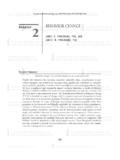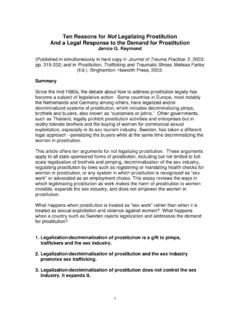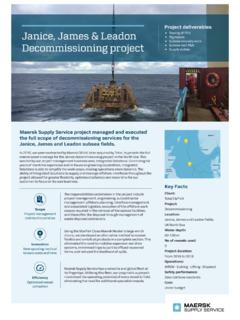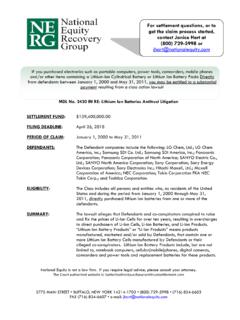Transcription of Accommodating Mental Illness - Nelligan O'Brien …
1 Accommodating Mental Illness IN THE WORKPLACE A Practical Guide INFONEX CONFERENCE Managing Your Duty to Accommodate: Effective Front-Line Accommodation Strategies March 27 and 28, 2012 Prepared by Janice B. Payne, Partner Natalia Werhun, Student-at-Law Table of Contents 1. INTRODUCTION .. 1 2. PROCESS FOR Accommodating Mental Illness .. 2 Accommodating Mental health disabilities vs. other types of disabilities generally .. 2 What to do when an employee reports or exhibits Mental health concerns .. 2 How to tell if an employee has a Mental Illness .. 3 What an employer should do if it suspects that an employee may be suffering from Mental Illness .. 3 Is an employee obligated to tell the employer that he or she is mentally ill.
2 5 Discharging the duty to accommodate .. 5 Duties of the parties generally .. 5 Employers duties .. 5 Employees duties .. 8 Medical documentation .. 8 Forms of accommodation .. 10 Disciplinary measures .. 13 Return to work considerations .. 13 Undue hardship .. 15 Health and safety concerns .. 19 3. CONCLUSION .. 20 1 1. INTRODUCTION Employees with Mental Illness can present particular challenges and difficulties for employers. Because Mental Illness is often not readily apparent, it can be difficult for employers to detect and accommodate this form of disability. However, notwithstanding these difficulties, employers have a legal duty to accommodate Mental health disabilities. In light of this, the goal of this paper is to provide a guideline and offer some practical tips for Accommodating workers with Mental Illness .
3 Disability is defined in section 25 of the Canadian Human Rights Act, , 1986, c. H-6 (Canadian Human Rights Act) as: .. any previous or existing Mental or physical disability and includes disfigurement and previous or existing dependence on alcohol or a drug .. According to the Canadian Human Rights Commission (CHRC): Mental Illness is characterized by alterations in thinking, mood or behaviour, or some combination thereof, associated with significant distress and impaired functioning. The symptoms of Mental Illness range from mild to severe, depending on the type of Mental Illness , the individual, the family and the socio-economic environment. Mental Illness may take many forms, including mood disorders such as depression and bipolar disorder; schizophrenia; anxiety disorders such as obsessive compulsive disorder and post-traumatic stress disorder; eating disorders; and In Ontario, disability is defined in subsection 10(1) of the Human Rights Code, 1990, c.
4 (the Code) and includes: .. (b) a condition of Mental impairment, .. (d) a Mental disorder .. According to the Canadian Psychiatric Association, Mental Illness generally means: .. significant clinical patterns of behaviour or emotions associated with some level of distress, suffering (pain, death), or impairment in one or more areas of functioning (school, work, social and family interactions). At the root of this impairment are symptoms of biological, psychological or behaviour dysfunction, or a combination of This definition of Mental Illness has been adopted by the Ontario Human Rights Commission (OHRC). Despite various stereotypes and perceptions, Mental Illness is not always crippling. Some illnesses will produce no noticeable effect on an employee s work, while others can be disruptive, causing reduced productivity, increased absenteeism and difficulty with interpersonal relationships.
5 A variety of conditions are encompassed within this disability and employers must be cognizant of the fact that not every Mental Illness will have the same effect on every person. As such, employers must develop an accommodation process that is suitable to the 1 Canadian Human Rights Commission s Policy and Procedures on the Accommodation of Mental Illness online: The Canadian Human Rights Commission < > at 5 ( Canadian Human Rights Commission s Policy and Procedures on the Accommodation of Mental Illness ). 2 Policy and Guidelines on Disability and the Duty to Accommodate (December 2009), online: The Ontario Human Rights Commission < > at 37 ( Policy and Guidelines on Disability and the Duty to Accommodate ).
6 2 individual needs of its employees. As a practical guide, this paper explores the process for Accommodating employees with Mental health disabilities. 2. PROCESS FOR Accommodating Mental Illness Accommodating Mental HEALTH DISABILITIES VS. OTHER TYPES OF DISABILITIES GENERALLY Employers have a duty to accommodate employees with disabilities. However, there is no set formula for accommodation. Each employee s needs are unique and must be considered afresh when an accommodation request is made, because a solution that may meet one employee s requirements may not meet the needs of another employee. Further, Mental disability raises particular issues that will merit independent Although Mental health disabilities may involve different considerations and warrant a different process for accommodation, Mental Illness must be accommodated in the workplace like any other disability.
7 Further, most employees with Mental Illness are capable of requesting accommodation and may only require it In fact, some employees may not require accommodation at all as the Illness may not impact their ability to perform the job. Since people with Mental Illness face many stigmas and stereotypes, employees are often hesitant to admit to their employer that they have a Mental Illness . They may fear reprisal from the employer or harassment from co-workers. Thus, employers should have an accommodation policy in place that addresses Mental Illness . Such a policy may make workers seeking accommodation feel more comfortable in raising their accommodation needs and will ensure that accommodation requests are dealt with effectively.
8 WHAT TO DO WHEN AN EMPLOYEE REPORTS OR EXHIBITS Mental HEALTH CONCERNS An employer s duty to accommodate arises when the employer becomes aware of the disability. Although often times the employee is able to communicate his or her need for accommodation to the employer, the challenge when dealing with Mental health is that some employees may not have come to terms with their Illness or are prevented from doing so as a result of the Illness and cannot take adequate steps to obtain treatment or seek As a result, employers are required to pay particular attention to signs that suggest that an employee may be suffering from Mental Illness . This is especially important in cases involving Mental health because the perception of disability alone is enough to trigger human rights law protection, even if the employer has not been formally advised of the employee s disability.
9 This was affirmed by the Human Rights Tribunal of Ontario (HRTO) in Krieger v. Toronto Police Services Constable Krieger, who had worked for the Toronto Police Service for only five months, was involved in a traumatic incident involving a struggle with an armed suspect. Shortly after this incident, he began experiencing symptoms of post-traumatic stress disorder (PTSD), which led to a second incident, in which he over-reacted in a situation involving a customer at a fast-food restaurant. During and after the incident at the restaurant, Constable Krieger acted in way which led his supervisors to believe that he could be experiencing PTSD. However, his supervisors did not act on their suspicions. Instead, Constable Krieger was suspended on the basis that he was unfit for duty and was investigated for misconduct.
10 3 Ibid at 8-10. 4 Canadian Human Rights Commission s Policy and Procedures on the Accommodation of Mental Illness , supra note 1 at 6. 5 Ibid. 6 2010 HRTO 1361. 3 Further, although medical evidence about his disability came to light during the labour relations process, the police service did not accommodate him. The Tribunal found that by failing to accommodate Constable Krieger s disability, his employer had discriminated against him. Although Constable Krieger was unable to recognize his PTSD and was unaware that he was experiencing a Mental health disability, it was clear to his employer that he was unwell and this triggered the employer s duty to accommodate. Constable Krieger was reinstated and the employer was ordered to develop an accommodation policy for police officers that have disabilities.









